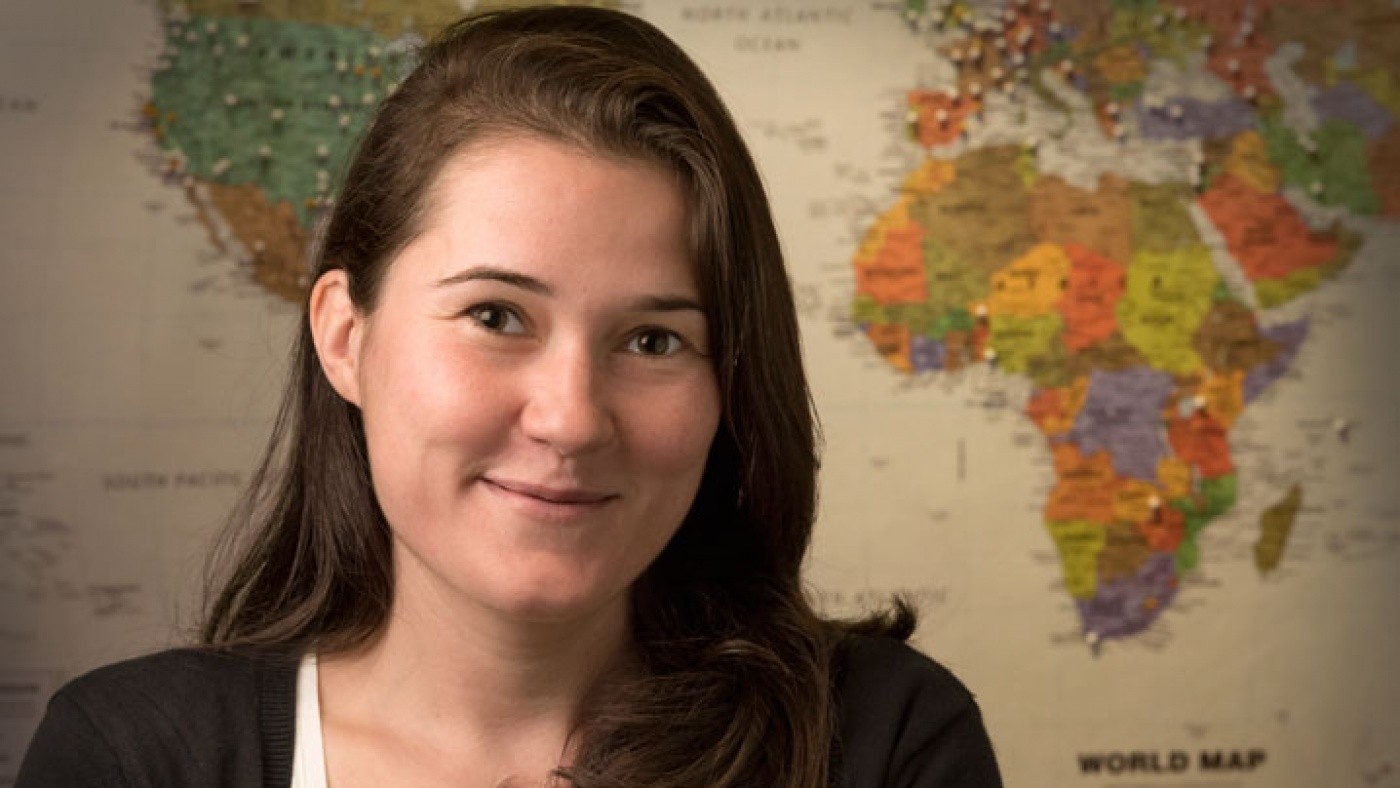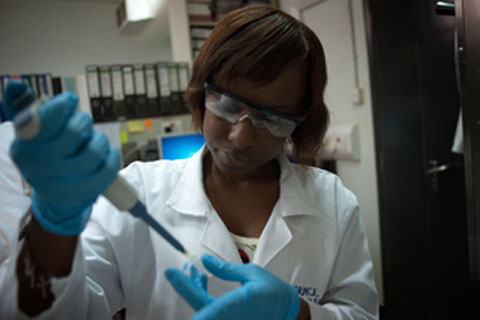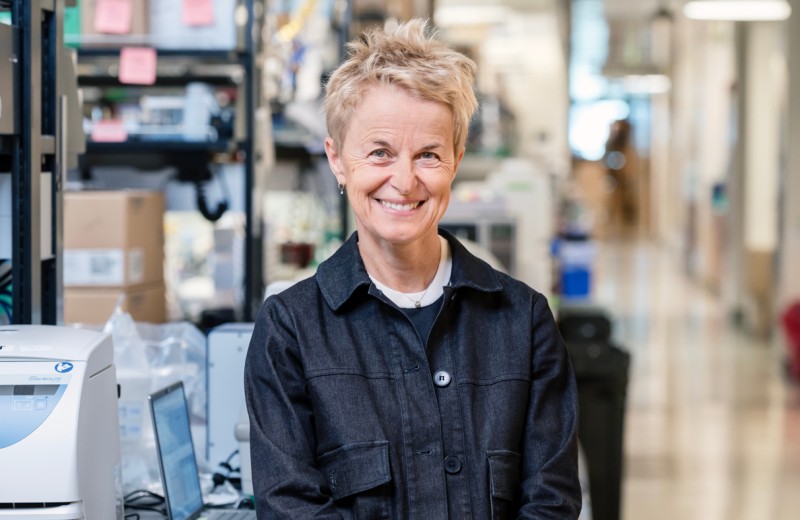Gladstone NOW: The Campaign Join Us on the Journey✕

By training scientists in Africa, Dr. Stefanie Sowinski is empowering local researchers to better fight infectious diseases and improving health on a global level. [Photo: Chris Goodfellow]
I will never forget my first encounter with an AIDS patient. Sick with both AIDS and tuberculosis, the 25-year-old man was so emaciated he couldn’t speak. And it was so difficult for him to swallow that he could barely eat. He was just skin and bones.
San Francisco or New York in the 1980s? No, this happened just four years ago in a rural hospital located a couple of hours north of Kampala, Uganda.
As part of my postdoctoral training at the Gladstone Institutes, I spent 12 months in Africa training Ugandan students and scientists in HIV research. I can honestly say that year changed my career and my life.
Turning the Lab into a Classroom
Thanks to a partnership between the University of California, San Francisco (UCSF), the Gladstone Institute for Virology and Immunology, and the Centers for AIDS Research (CFAR), along with the Infectious Diseases Institute (IDI)—an East African center for medical research—I now live part of the year in Kampala. There, I lead a laboratory that trains young Ugandan scientists and encourages scientific collaborations between East Africa and the US and Europe. As director of the IDI Translational Research Lab, I teach local researchers how to apply for project grants, devise and run laboratory experiments, and use and maintain complex laboratory equipment needed for their studies.
My students in Kampala are intelligent and highly motivated to learn. For example, two young women, Grace and Sheila, who started as research assistants in the lab quickly gained expertise in operating complicated equipment. This includes a real-time PCR (polymerase chain reaction) machine, which reads and analyzes DNA, and a flow cytometer—a scientific instrument for analyzing cells. Now, in addition to helping run other peoples’ experiments, the two women conduct their own studies using grant funding that I helped them to secure. The transition from assisting on a research project to leading one takes time, but facilitated by my mentoring efforts, these women made the jump in just one year.
 Scientists at the IDI Translational Research Lab are investigating how HIV affects a person's risk for cardiovascular disease, as well as how patients respond to vaccines for other viruses, like influenza. [Photo: Will Boase]
Scientists at the IDI Translational Research Lab are investigating how HIV affects a person's risk for cardiovascular disease, as well as how patients respond to vaccines for other viruses, like influenza. [Photo: Will Boase]
The IDI Translational Research Lab also fosters greater collaboration between Gladstone, UCSF, and other US universities that are doing field work in Africa. In a resource-limited setting, it is essential to share equipment, expertise, and research participants. At IDI, scientists from Harvard University, Johns Hopkins University, University of Minnesota, and UCSF use our facilities and work together on a variety of different diseases. This type of collaboration drives discoveries faster than when researchers are siloed within their respective labs and institutions, limited to their immediate resources only.
Improving Testing and Treatment
Our work also has a direct impact on the health of the citizens of Uganda. Together with colleagues from the University of Minnesota and Baylor College, we established a better way to test for helminth infections—parasitic worms that affect 25% of the population in Sub-Saharan Africa. The new diagnostic test can be done at IDI, leading to improved treatment for patients in the region.
Promoting Africa-Centered Research
These advances have improved health conditions in Kampala. However, to better help Ugandan scientists take charge of public health in their own country, they need to be empowered to conduct their own research.
Most medical studies take place in the US and Europe, and their findings don’t necessarily apply to people who live in other parts of the world. Diet, living conditions, and exposure to other infections vary wildly from continent to continent and can significantly affect a patient’s health or disease course. More practically, some blood tests have to be done immediately, as freezing a sample can kill cells and ruin a reading. This means the sample cannot be sent overseas for analysis and has to be processed where it is taken.
For these reasons, scientists must be able to conduct high-quality research in Africa and the equipment and the technicians must meet the same standards as elsewhere in the world. This means exposure to world class research methods through partnerships with international research institutions, such as the one from Gladstone that has supported my work here, as well as investment in facilities.
Making a Difference
While a tremendous amount of progress has been made in the fight against HIV, there is still much to be done. To have the greatest impact, scientists in Uganda must be able to set their own research agendas based on the most pressing local needs, and this requires them to have the capacity to run their own experiments. Therefore, we need to train more students like Grace and Sheila so that they can proficiently run local studies while gaining the expertise to conduct their own research. By empowering local communities to test and treat their own, we can better fight infectious diseases and improve health on a global level.
My interest in Africa developed for both scientific and humanitarian reasons. I believe that my greatest contribution to improving global health is to conduct and facilitate research, thereby increasing our scientific knowledge to change the lives of patients around the world.
Stefanie Sowinski, PhD, is a staff scientist at the Gladstone Institute of Virology and Immunology and the director of the Infectious Disease Institute Translational Research Lab.
One Person’s Final Gift to Science Gets Us Closer to an HIV Cure
One Person’s Final Gift to Science Gets Us Closer to an HIV Cure
A new documentary follows Jim Dunn’s end-of-life decision to donate his tissues to HIV research.
Institutional News HIV/AIDS Infectious Disease Roan LabBeyond Viruses: Expanding the Fight Against Infectious Diseases
Beyond Viruses: Expanding the Fight Against Infectious Diseases
The newly renamed Gladstone Infectious Disease Institute broadens its mission to address global health threats ranging from antibiotic resistance to infections that cause chronic diseases.
Institutional News News Release Cancer COVID-19 Hepatitis C HIV/AIDS Zika Virus Infectious DiseaseCharting the Body’s Defense Against HIV Leads to Broader Immune Revelations
Charting the Body’s Defense Against HIV Leads to Broader Immune Revelations
Gladstone scientists created a new tool to understand the immune system’s inner workings when confronted with a virus.
Research (Publication) HIV/AIDS Infectious Disease Roan Lab



